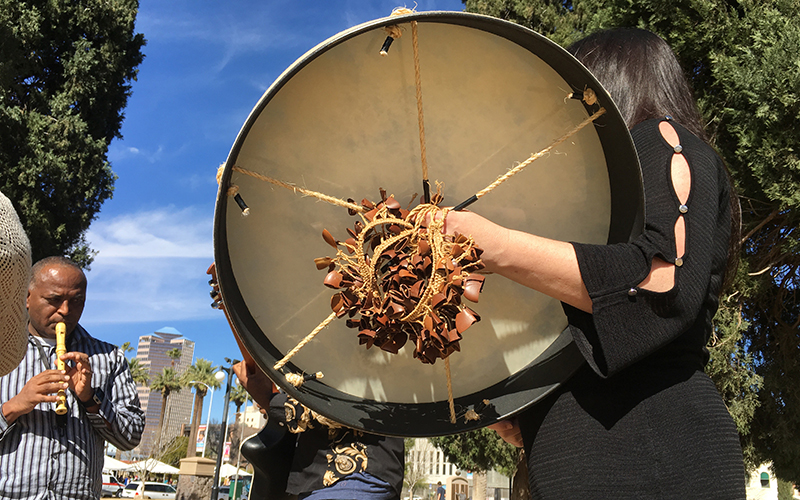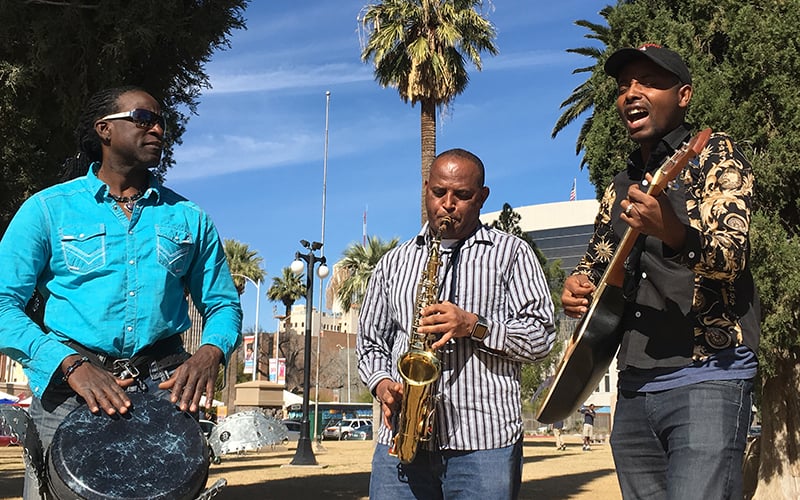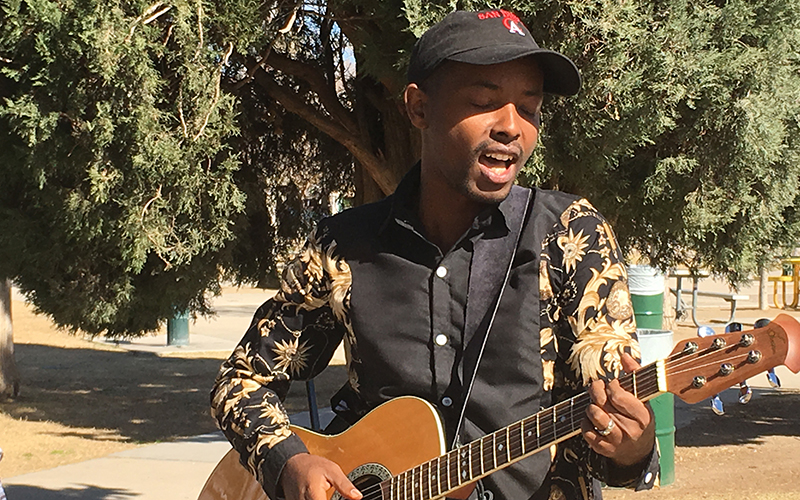TUCSON — On a beautiful day in Armory Park in the downtown area, a unique blend of music emanates from between the trees. A sax player from Ethiopia, a guitarist from Burundi, and drummers from Trinidad & Tobago and the U.S. create a cross-cultural sound.
This is the creation of Jam2Grow, a group that uses drumming and music as therapy for refugees from around the world.
“Being a refugee is very challenging,” said Jean Marie Menutore from Burundi. Through drumming, Menutore said, “your frustrations go into that drum.”
The idea behind Jam2Grow grew out of a partnership between musician Richard Noel, originally from Trinidad & Tobago, and Sherrie Cox, a dancer from the U.S. They met when Noel sat in as a drummer for one of Cox’s dance classes and realized they had a shared passion for bringing peace to humanity.
“The most emotional things I’ve seen in my life have been through working with refugees,” Cox said. “When I see music turn suffering into joy, it fills my heart.”
Cox pointed out that many of the refugees they work with have been through extremely difficult situations, including being beaten, tortured, and seeing family members killed.
Instead of reminding refugees of their past, Jam2Grow hopes to bring them to the present and prepare for their future lives in the U.S.
“We ask them what they want, and they all say ‘happiness,'” said Noel. “Most of the refugees have a lot of barriers, one is language, another is religion, and the third is self esteem.”

Drumming is an integral part of the music therapy that Jam2Grow uses to help refugees heal. (Photo By: Mindy Riesenberg/ Cronkite News)
Through drumming and music, Noel said he sees a change in the refugees.
“I see a lot of hope and confidence, and most of them say they are feeling happy now,” he said.
Drums are central to the classes because they beat like the rhythm of the heart, according to Noel.
“Rhythm is a universal language,” he said, “and if you put people together from different countries, they will connect.”
The participants are encouraged to express their individual cultures through the music sessions, creating a panoply of sound that bridges borders.
Tilahun Liben, a refugee from Ethiopia, knows firsthand how music and drumming can assist refugees in their healing and transition. He spent 10 years in a refugee camp in Kenya where he witnessed the trauma those in the camp faced.

Richard Noel, CEO of Jam2Grow, plays drums while refugees Tilahun Liben of Ethiopia and Jean Marie Menutore of Burundi play instruments from their African countries to create a unique blend of music. (Photo by Mindy Riesenberg/Cronkite News)
“When I was in the camp, all the nationalities would bring their culture to music,” he said, pointing out that many of the camp’s residents would normally be fighting each other and that music brought them together.
Liben also stressed that when refugees arrive in the U.S., “They aren’t ‘here’ immediately, and it takes time.”
“The first time I jammed with the group here it was the first time I was really calm,” Liben said. “Music is key to healing the soul.”
When refugees come to the U.S., they are generally given three months of assistance, after which they are expected to find a job, pay their own rent, and begin to live on their own.
“It’s very hard to find jobs in a new country and there’s a lot of pressure after the three months are up,” Menutore said. “I see people who are frustrated and angry, and the drumming program is very important to helping them relax.”

Jean Marie Menutore of Burundi sings and plays guitar during a music as therapy session. (Photo by Mindy Riesenberg/Cronkite News)
Zoe Sarabo, a case manager for Refugee Focus, said the drumming sessions have helped refugees heal from traumatic experiences.
“Richard does an amazing job of helping the refugees enjoy the space at that moment in time,” she said.
“Our motto is for people to experience true joy,” Noel said.
Noel explained that Jam2Grow isn’t out to teach the refugees, but to learn from them.
“Refugee is just a status,” he said. “You have to remember that a lot of these people were doctors, scientists, musicians and well-respected members of their communities. They just got disrupted. They come here as refugees but as soon as they clear customs, they go back to being themselves.”